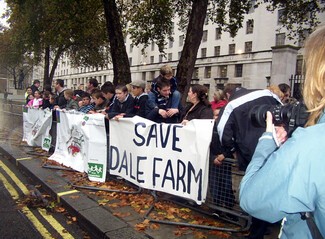The Big Gypsy Eviction
Photo: Richard Parry / Hardcash Productions
"We're not going to go peacefully – I can tell you that now," says Mimi Sheridan. Piles of gas canisters block the entrance to Dale Farm as Mimi and 50 families brace themselves for the final showdown.
I have been filming on and off at the Dale Farm Travellers' site, near Basildon in Essex, for six years. The site is Europe's largest illegal encampment of Travellers. A thousand Travellers live there, but only half of them have planning permission for their pitches. After exhaustive legal disputes that have gone all the way to the House of Lords and the European court of human rights, this epic battle is reaching a climax. Basildon council has finally decided to go ahead with what will be the UK's biggest eviction in modern history. The Travellers have been issued with notices giving them until the end of August to leave.

I never thought I would see the day. For years the Travellers have said they would not leave without an almighty struggle. "Basildon will burn!" they vowed. They have threatened to bury gas canisters and fill ditches with petrol. If they were forced off, they said, they would block the M25 with caravans and pull on to the council's land instead.
These Travellers have welcomed me into their homes. They have shown me a part of British society that until recently was kept well-guarded. On the other side of the fence, literally, I have spent a fair amount of time with their arch enemy, Len Gridley, a local whose garden backs on to the site and who has pressed the council for ten years to carry through its threat to evict.
On a personal level, it is hard not to warm to the Travellers. They are a vibrant, engaging, humorous lot, welcoming to those they perceive as friendly. I filmed Cathleen McCarthy only a week before she and her husband died in a caravan fire in 2005. I brought the recordings of her singing for her daughter to hear. It was the strangest day for me, as women in black gathered on the charred site to listen to the ghostly voice being played from a car stereo. I have also filmed her brother singing the same songs in his home in Rathkeale, Ireland.
You are either a friend or foe in Travellers' eyes, with not much of a grey area in between. Living cheek by jowl has not been easy for some of their neighbours. House prices have collapsed and they have been unable to sell up. And the one or two that have made a noise about the illegal plots at the end of their gardens have suffered the wrath of their enemy. Len Gridley has received public death threats and no doubt numerous private ones. Some Travellers have told me: "If we go, he goes." They have threatened that there will be "a price to pay".
There is a local, anti-Gypsy rhyme, popular with some: "The planning laws, they are a joke/ They don't apply to the pikey bloke." Now only Gridley is left with his head above the parapet. "I've had death threats on national television, I've had death threats in the lane, but I won't let them intimidate me," he says.
Interestingly, it turned out during my filming that Gridley had relatives who were English Gypsies. He has no problem with them, saying they have adapted to modern life and settled down. But Gridley's war with the Travellers now seems to devour his whole life. You wonder how he will fill his days when the eviction has come and gone.
If the Travellers don't go quietly (no one thinks they will), and the bailiffs and police move in, I seriously doubt that there will be anything less than a full-scale battle. More than 500 police and bailiffs will be needed to clear 500 Travellers from land that some of them say they are prepared to die for. The stakes are high and the two sides have been squaring up for years. On a personal level, I think the Travellers have taken this battle to heart. They are familiar with conflict and many of the older generation grew up on the roadsides, where life was tough and strife was common.
Mimi is one of the main contributors to our film. She is an Irish Traveller who lost her daughter in a motorbike accident two years ago and has been living in the shadow of that tragedy ever since. She has no savings and has little left to lose in a potential battle. She was deeply depressed after the loss of her daughter and might have ended her own life if it weren't for her Catholicism.
I am sure she will be at the forefront of any pitched battles. When the council tried to serve the 28-day notice (on 4 July) she and other women met them with a pile of gas canisters. They doused the canisters in petrol and stood threateningly with a lit lighter. As the bailiffs and police retreated, she immersed an old teddy bear in fuel, set light to it and threw it after them. "This is now a no-go site. They're not welcome any more."
I find myself conflicted. I have come to know these people, who have opened their doors to me and let me film them. I also understand and appreciate the need to enforce a green belt policy. But there must be a better solution than the primitive old-style evictions that they now face.
It will cost £10m and the question remains: where will these people go? The problem will not just disappear – it will merely be displaced to anger other communities.